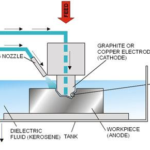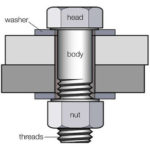Mechanical engineering is a fascinating and diverse field that plays a crucial role in shaping the modern world. From designing complex machinery to developing innovative solutions for global challenges, mechanical engineers are at the forefront of technological advancements. In this article, we will explore the history, concepts, applications, and future of mechanical engineering, delving into the various aspects that make it a compelling and dynamic profession.

Introduction to Mechanical Engineering
Mechanical engineering is a branch of engineering that focuses on the design, analysis, manufacturing, and maintenance of mechanical systems. It combines principles of physics, mathematics, and materials science to create practical solutions that impact various industries. Mechanical engineers are problem solvers who use their expertise to develop products and processes that enhance our daily lives.
The History and Evolution of Mechanical Engineering
The roots of mechanical engineering can be traced back to ancient civilizations, where innovative minds designed simple machines for agricultural and construction purposes. However, it wasn’t until the Industrial Revolution that mechanical engineering emerged as a distinct discipline. The development of steam engines and machines during this period marked a significant milestone in the field’s history.
Key Concepts and Principles in Mechanical Engineering
To understand the breadth of mechanical engineering, one must grasp essential concepts like mechanics and dynamics, thermodynamics, materials science, fluid mechanics, and control systems. These principles are the building blocks on which mechanical engineers base their designs and analyses.
Mechanics and Dynamics
Mechanics deals with the study of forces and motion, encompassing statics (objects at rest) and dynamics (objects in motion). It is fundamental to understanding how various components within a system interact and respond to external forces.
Thermodynamics
Thermodynamics explores the principles of energy transfer and conversion. Mechanical engineers apply these concepts to design energy-efficient systems and optimize performance in power generation and propulsion.
Materials Science
Materials science is integral to mechanical engineering as it involves understanding the properties and behaviour of materials such as steel and aluminium often used for the manufacture of sheet metal fabrications and engineering applications. This knowledge aids in selecting the right materials for specific purposes to ensure reliability and durability.
Fluid Mechanics
Fluid mechanics deals with the study of fluids and their interactions with solid boundaries. This knowledge is crucial in designing systems like pumps, turbines, and HVAC (heating, ventilation, and air conditioning) systems.
Control Systems
Control systems are vital in maintaining the desired behaviour of mechanical systems. These systems use feedback mechanisms to regulate outputs and ensure stability and accuracy in various applications.
Also Read:
- What is CAD – Computer Aided Designing?
- What is Computer Aided Manufacturing – CAM?
- What is a Hatchback Car?
Importance and Applications of Mechanical Engineering
Mechanical engineering finds applications in various industries, and its significance is evident in the following fields:
Aerospace Engineering
Mechanical engineers play a crucial role in the aerospace industry, designing aircraft, spacecraft, and propulsion systems. They focus on optimizing aerodynamics and structural integrity to ensure safe and efficient flight.
Automotive Engineering
In the automotive sector, mechanical engineers work on developing cutting-edge technologies, improving vehicle performance, and enhancing fuel efficiency while adhering to safety standards.
Robotics and Automation
Mechanical engineers are at the forefront of robotics and automation, developing intelligent machines that streamline manufacturing processes and perform tasks that are dangerous or tedious for humans.
Energy Systems
Mechanical engineers are involved in designing renewable energy systems like wind turbines and solar panels, contributing to the global effort to shift towards sustainable energy sources.
Educational and Career Paths in Mechanical Engineering
For aspiring mechanical engineers, a clear educational path is essential to gain the necessary skills and knowledge:
Bachelor’s Degree in Mechanical Engineering
A bachelor’s degree in mechanical engineering is the foundational step for a career in this field. Students study core subjects like mechanics, thermodynamics, and materials science, gaining a broad understanding of the discipline.
Master’s Degree and Specializations
Pursuing a master’s degree allows individuals to specialize in specific areas, such as robotics, aerospace, or renewable energy. Advanced knowledge and expertise in these domains open up exciting opportunities in specialized industries.
Job Opportunities and Salaries
Mechanical engineers can find employment in various sectors, including aerospace, automotive, manufacturing, and energy. Salaries vary based on experience, specialization, and the industry but generally offer competitive compensation.
Innovations and Future Trends in Mechanical Engineering
The world of mechanical engineering is constantly evolving, and several innovative trends are shaping its future:
Additive Manufacturing (3D Printing)
Additive manufacturing, commonly known as 3D printing, has revolutionized the manufacturing process, enabling rapid prototyping, cost-effectiveness, and customization of products.
Internet of Things (IoT) in Mechanical Systems
The integration of IoT in mechanical systems allows real-time data collection and analysis, optimizing performance, and enabling predictive maintenance.
Renewable Energy Solutions
Mechanical engineers continue to explore and implement innovative renewable energy solutions to address environmental concerns and reduce dependence on fossil fuels.
Autonomous Vehicles
The development of autonomous vehicles is a frontier in mechanical engineering, with the potential to transform transportation and improve road safety.
Challenges and Ethical Considerations in Mechanical Engineering
With great innovation comes responsibility. Mechanical engineers face various challenges and ethical considerations in their work:
Environmental Impact
As technologies advance, there is a growing need to ensure that engineering solutions are environmentally sustainable, minimizing the ecological footprint.
Safety and Reliability
Mechanical engineers must prioritize safety and reliability in their designs to prevent accidents and ensure the well-being of users.
Ethical Engineering Practices
Ethical considerations are essential in decision-making processes to address potential social and moral implications.
Conclusion
Mechanical engineering has played a crucial role in the progress of humanity, revolutionizing industries and improving our quality of life. As technology continues to advance, the field will face new challenges, but with skilled and innovative professionals, it will continue to shape a better future.
FAQs (Frequently Asked Questions)
What is mechanical engineering?
Mechanical engineering is a branch of engineering that focuses on designing, analyzing, and manufacturing mechanical systems and devices.
What are some essential principles in mechanical engineering?
Some essential principles include mechanics and dynamics, thermodynamics, materials science, fluid mechanics, and control systems.
What are the career prospects for mechanical engineers?
Mechanical engineers have diverse career opportunities in industries like aerospace, automotive, robotics, and renewable energy, among others.
How does 3D printing impact mechanical engineering?
3D printing enables rapid prototyping, cost-effectiveness, and customization of products, revolutionizing the manufacturing process.
What are the future trends in mechanical engineering?
Future trends include the integration of IoT in mechanical systems, advancements in renewable energy solutions, and the development of autonomous vehicles.








